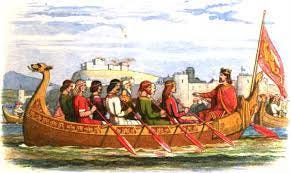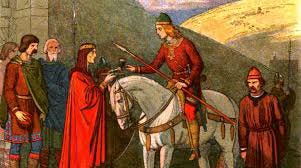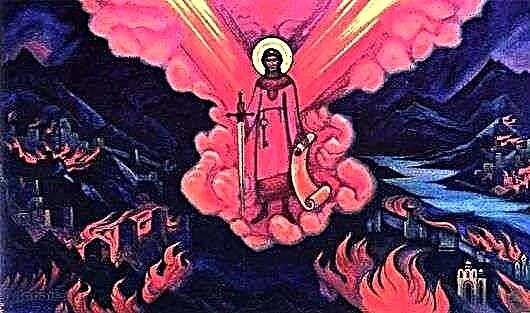Alfred's son, Edward the Elder, successfully built upon his father's achievements. Together with his sister, Aethelfaed, he steadily clawed back territory, forcing the Danes back, further north and east into the Danelaw. His successor, Athelstan (924-939), reconquered Northumbria and compelled the Scottish king, Constantine II, to accept him as his overlord. The Vikings and Scots launched a joint revenge attack on England in 937, but Athelstan smashed them at Brunanburh in Cheshire and became the undisputed master of the island. He was England's Charlemagne – a soldier-statesman of international renown – a commander, a legislator, a unifier, and a model and exemplar of what a sanctified Christian king should be.
He was also a hard act to follow. Three underwhelming sovereigns – Edmund (939-946), Eadred (946-955), and Eadwig (955-959) – all failed in varying degrees to step free from his shadow. Eadwig was a particularly inept ruler, picking quarrels with the Church and bundling St. Dunstan, one of the holiest men in Europe, off into exile. Many in the country, especially in Mercia and Northumbria, began to feel that his younger brother, Edgar, would make a more fitting leader. Wessex remained loyal to Eadwig, however, but his premature death in 959 put an end to all argument.
Right from the outset, Edgar displayed a wisdom, skill and judgment that belied his years. He brought a calm authority to everything he did and said, and he ruled so well, with such natural ease and ability, that peace and prosperity blossomed in the land, and he became known as Edgar the Peaceable. He recalled St. Dunstan and made him Bishop of Worcester, then Bishop of London, then Archbishop of Canterbury. Monastic life was reformed and reinvigorated, and England became a powerhouse of prayer.
If Athelstan had been a Saxon Charlemagne, then Edgar was England's Chakravatin – the hub of the wheel, the unmoved mover, the still point at the nub of the universe. In him was fulfilled everything that his predecessors – Athelstan, Edward, Aethelflaed, and Alfred – had fought for and believed in. A coronation ceremony was held in 973 in Bath Abbey to mark the King’s achievements. St. Dunstan placed the English crown upon his head and proclaimed him EDGAR REX ANGLI OMNI – Edgar, King of All the English. Later that year, to cap the commemorations, Edgar convened a Great Council at Chester and was rowed in state along the River Dee by eight British sub-kings, including Kenneth II of Scotland and Máel Coluim I of Strathclyde.
This was a time of promise and potential. Ancient memories began to stir. People compared Edgar to Arthur, Brutus and Brân. They remembered the deeds of Constantine and the five-hundred-year presence of the Grail in Glastonbury. There were hidden tunnels too, they said, plus a secret line of priest-kings, and holy images buried in a cave somewhere, brought to Britain from the flaming ruins of Troy.
The country stood on the brink of a renaissance that would have shaken and transformed the world. But evil never sleeps, and just as in the days of Arthur when men had been seduced by Mordred's lies, so now the cancer of resentment began to gnaw and writhe. Large portions of the nobility resented Edgar's prioritisation of religion. They failed to grasp his vision and felt that the revenues they paid to maintain the monasteries would be better suited to their own purses.
Edgar was unassailable, of course, but he died suddenly in 975 and the nobles spied an opportunity. The crown should have passed automatically to Edgar's eldest son, Edward, then aged thirteen. But Edward's mother was dead and the widowed Queen, Elfthryth, also had a son by Edgar, the six-year-old Aethelred. Elfthryth sided with the nobility in their dispute with the Church and a campaign was set in motion to place Aethelred upon the throne. But St. Dunstan insisted on Prince Edward, and such was his prestige and influence that none could gainsay him.
For three years the King and Archbishop worked in tandem to continue Edgar's mission. But the powers of evil were circling, and in March 978 they seized their moment with avaricious and sacrilegious hands. Edward, while out hunting, lost contact with his retinue and drifted dangerously close to Aethelred's castle. The Queen saw him approaching on his horse and feigned to welcome him with sweet, deceptive words and a flagon of mead. As the King received his drink, a servant kissed him on the cheek then turned and stabbed him in the back until he died.
They took the Lord's anointed and dumped his royal remains in the house of a blind woman who lived nearby. When she awoke, she found that she could see, and the first thing she saw was the body of the King lying cold and neglected on the floor. She gave thanks to God for the gift of sight and sang psalms of lamentation, through tears of mingled joy and sorrow, for her beautiful, broken, butchered King. She anointed his head with myrrh and bathed his feet in scented water, wiping them dry with her hair. When this woman died, many years later, Edward, now a saint in Heaven, interceded for her before the Judgment Seat and her sins were instantly forgiven.
Divine retribution on England for this heinous act of regicide was swift and unforgiving. Viking raids resumed with unparalleled ferocity and a terrifying strategic capability. Neither Aethelred nor his mother, still less the corrupted nobility, had any idea how to respond. There was no centre anymore, no pivot at the heart of things, no universal ruler to command and dictate. It was a sheer and catastrophic fall, lightning-quick and endless, with no discernible bottom. Grown men screamed in terror and eight-foot demons were seen stalking the streets of London, Winchester and York. The majesty and might of Edgar's reign – the kingdom, the power, and the glory – were wiped away and rolled up like a scroll, as if those days had never been.








An excellent accounting. Historians don’t point out the divine retribution inherent in the aftermath of Edward’s murder, but it is there, for those with eyes to see.